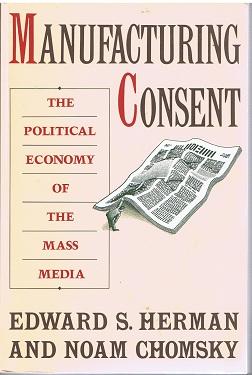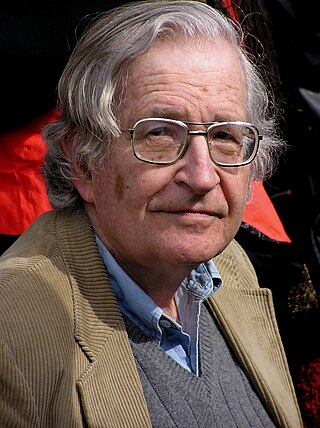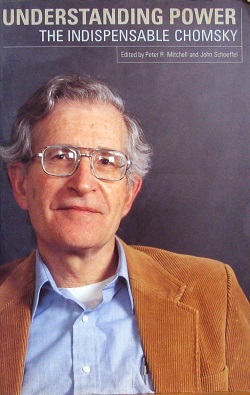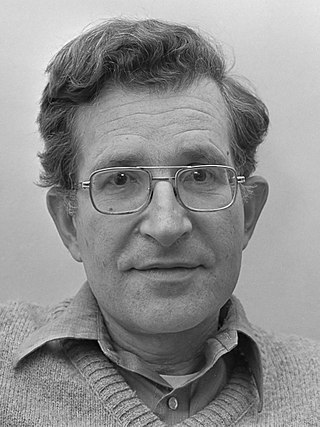
Manufacturing Consent: The Political Economy of the Mass Media is a 1988 book by Edward S. Herman and Noam Chomsky. It argues that the mass communication media of the U.S. "are effective and powerful ideological institutions that carry out a system-supportive propaganda function, by reliance on market forces, internalized assumptions, and self-censorship, and without overt coercion", by means of the propaganda model of communication. The title refers to consent of the governed, and derives from the phrase "the manufacture of consent" used by Walter Lippmann in Public Opinion (1922). The book was honored with the Orwell Award.

Avram Noam Chomsky is an American professor and public intellectual known for his work in linguistics, political activism, and social criticism. Sometimes called "the father of modern linguistics", Chomsky is also a major figure in analytic philosophy and one of the founders of the field of cognitive science. He is a laureate professor of linguistics at the University of Arizona and an institute professor emeritus at the Massachusetts Institute of Technology (MIT). Among the most cited living authors, Chomsky has written more than 150 books on topics such as linguistics, war, and politics. Ideologically, he aligns with anarcho-syndicalism and libertarian socialism.

Wage slavery is a term used to criticize exploitation of labor by business, by keeping wages low or stagnant in order to maximize profits. The situation of wage slavery can be loosely defined as a person's dependence on wages for their livelihood, especially when wages are low, treatment and conditions are poor, and there are few chances of upward mobility.
The international community is a term used in geopolitics and international relations to refer to a broad group of people and governments of the world.

An intellectual is a person who engages in critical thinking, research, and reflection about the reality of society, and who proposes solutions for its normative problems. Coming from the world of culture, either as a creator or as a mediator, the intellectual participates in politics, either to defend a concrete proposition or to denounce an injustice, usually by either rejecting, producing or extending an ideology, and by defending a system of values.

The propaganda model is a conceptual model in political economy advanced by Edward S. Herman and Noam Chomsky to explain how propaganda and systemic biases function in corporate mass media. The model seeks to explain how populations are manipulated and how consent for economic, social, and political policies, both foreign and domestic, is "manufactured" in the public mind due to this propaganda. The theory posits that the way in which corporate media is structured creates an inherent conflict of interest and therefore acts as propaganda for anti-democratic elements.
The Faurisson affair was an academic controversy following publication of a book, Mémoire en défense (1980), by French professor Robert Faurisson, a Holocaust denier, and the inclusion of an essay by American linguist Noam Chomsky, entitled "Some Elementary Comments on the Rights of Freedom of Expression", as an introduction to Faurisson's book.

Hegemony or Survival: America's Quest for Global Dominance is a book about the United States and its foreign policy written by American political activist and linguist Noam Chomsky. It was first published in the United States in November 2003 by Metropolitan Books and then in the United Kingdom by Penguin Books.
Edward Samuel Herman was an American economist, media scholar and social critic. Herman is known for his media criticism, in particular the propaganda model hypothesis he developed with Noam Chomsky, a frequent co-writer. He held an appointment as Professor Emeritus of finance at the Wharton School of Business of the University of Pennsylvania. He also taught at Annenberg School for Communication at the University of Pennsylvania.
South End Press was a non-profit book publisher run on a model of participatory economics. It was founded in 1977 by Michael Albert, Lydia Sargent, Juliet Schor, among others, in Boston's South End. It published books written by political activists, notably Arundhati Roy, Noam Chomsky, bell hooks, Winona LaDuke, Manning Marable, Ward Churchill, Cherríe Moraga, Andrea Smith, Howard Zinn, Jeremy Brecher and Scott Tucker. South End Press closed in 2014.

Noam Chomsky is an intellectual, political activist, and critic of the foreign policy of the United States and other governments. Noam Chomsky describes himself as an anarcho-syndicalist and libertarian socialist, and is considered to be a key intellectual figure within the left wing of politics of the United States.
"The Responsibility of Intellectuals" is an essay by the American academic Noam Chomsky, which was published as a special supplement by The New York Review of Books on 23 February 1967.
In world politics, Jewish state is a characterization of Israel as the nation-state and sovereign homeland of the Jewish people.
A pariah state is a nation considered to be an outcast in the international community. A pariah state may face international isolation, sanctions or even an invasion by nations who find its policies, actions, or even its very existence unacceptable.
This is a list of writings published by the American author Noam Chomsky.

Occupy is a short study of the Occupy movement written by the American academic and political activist Noam Chomsky. Initially published in the United States by the Zuccotti Park Press as the first title in their Occupied Media Pamphlet Series in 2012, it was subsequently republished in the United Kingdom by Penguin Books later that year.

Understanding Power: The Indispensable Chomsky, published in 2002, is a collection of previously unpublished transcripts of seminars, talks, and question-and-answer sessions conducted by Noam Chomsky from 1989 to 1999.

The Chomsky–Foucault debate was a debate about human nature, between Noam Chomsky and Michel Foucault at the Eindhoven University of Technology in the Netherlands, on 22 October 1971 at 7:30 p.m. The debate was broadcast on 28 November 1971 at 9:30 p.m. Chomsky and Foucault were invited by the Dutch philosopher Fons Elders to discuss an age-old question: "is there such a thing as 'innate' human nature independent of our experiences and external influences?"

Decoding Chomsky: Science and Revolutionary Politics is a 2016 book by the anthropologist Chris Knight on Noam Chomsky's approach to politics and science. Knight admires Chomsky's politics, but argues that his linguistic theories were influenced in damaging ways by his immersion since the early 1950s in an intellectual culture heavily dominated by US military priorities, an immersion deepened when he secured employment in a Pentagon-funded electronics laboratory in the Massachusetts Institute of Technology.










